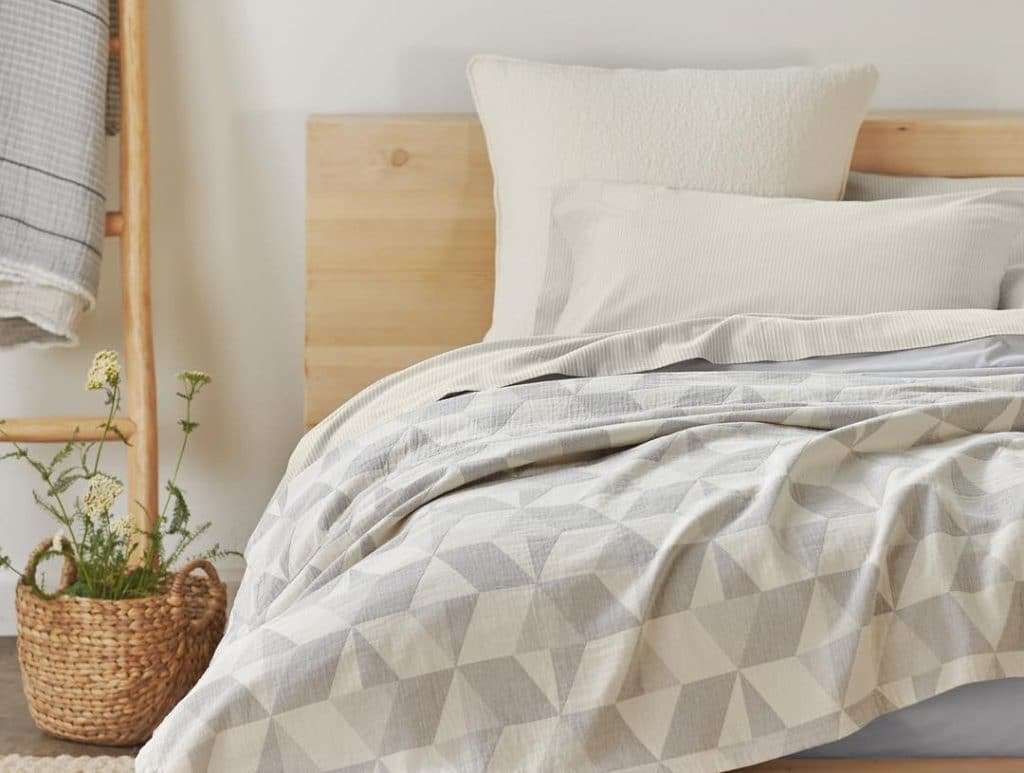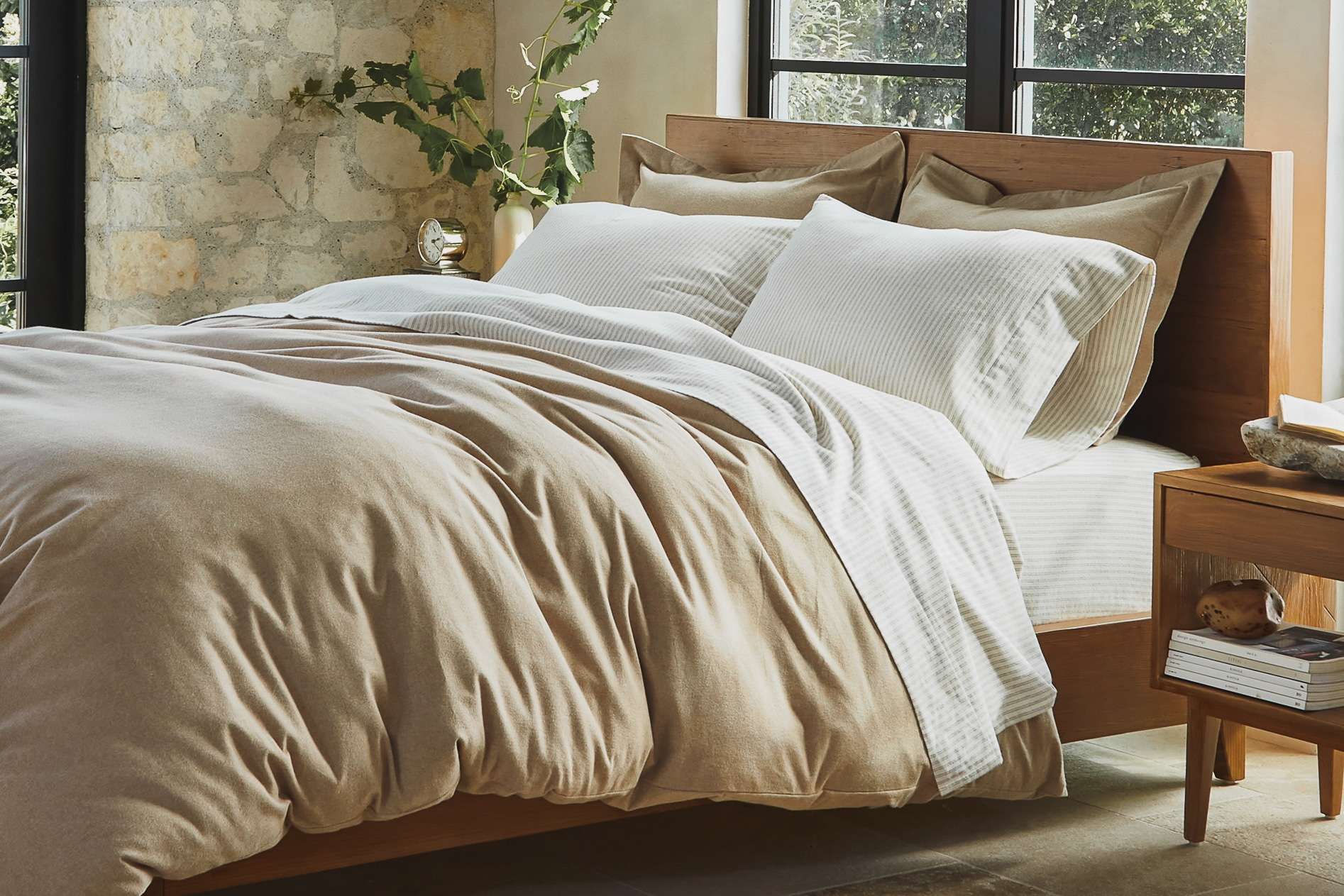Leading luxury home goods brand Coyuchi has formed a new climate council aimed at achieving net-zero emissions by 2025.
With help from industry leaders across fashion, agriculture, and sustainability initiatives, 30-year-old leading luxury organic bed, bath, and apparel brand, Coyuchi, has formed a climate council that it says will help it to become net-zero by 2025 and fully net-positive by 2030.
The new Coyuchi Climate Council includes Jeff Hogue, Chief Sustainability Officer of Levi’s; Cara Chacon, Founder and Principal Consultant, Intentum Corporate Responsibility Consulting (formerly Patagonia); Steve Finkel, Founder and President, White Buffalo Land Trust; and Amanda Cattermole, Founder of Cattermole Consulting Inc.
The experts bring knowledge from a range of disciplines including regenerative agriculture, GHGs and carbon offsets, ESG reporting, textile chemistry, and circular systems, all aimed at moving the brand closer to its targets.
Coyuchi Climate Council
“Coyuchi’s pursuit of sustainable innovation has never been achievable in a silo. The complexities of the textiles supply chain do not allow for us to work alone, and when we launched our first circular product in 2020, we recognized the true value of our network in the battle against climate change,” Eileen Mockus, CEO and President of Coyuchi, said in a statement.
“This small but mighty group of leaders was carefully selected for their deep-rooted expertise across industries and I am confident they will push Coyuchi to be innovative and aggressive with achieving our goals.”

For decades, Coyuchi has been at the forefront of the organic textiles movement, committed to transparency, product innovation, and sustainable practices. The company carries certifications from GOTS, GOLS, Fairtrade, and Made Safe, among others for its home goods including bedding, towels, and robes. It was the first home brand to create a fully circular product in 2020—an achievement that earned the brand recognition in the 2021 Ryan Young Climate+ Awards for Climate Leaders.
“We were already committed to organic fiber,” Mockus told Forbes in 2020. “That’s kind of the basis of how the company was founded. In my time with Coyuchi, we’ve kind of reestablished what the brand values are, and how we evolve what the meaning of sustainability is to the business. And that goes hand-in-hand with innovation,” she said.
“We were following Global Organic Textile Standard (GOTS) certification, but we got ourselves GOTS-certified, which means that we get additional visibility to the supply chain, but it also means that all of our processing steps have kind of a safety component to them.”
The news comes as Parachute, another female-led home goods brand, announced its ambitious plans to become certified carbon neutral by Earth Day (April 22), 2022.
Sustainability targets
All of these pivots are what Mockus says really make a difference to the customer.
“The textile industry is headed towards a circular model and this element of factoring in the climate impact of the textile industry. That’s where our initiatives are going to go. We were a great candidate for the circular economy because we were already doing the things that allow us to renew and recycle our product. That’s been a big chunk of the innovation that we’ve wanted to focus on for the last couple years, and there’s still more to be done,” says Mockus.
“We’re now also looking at chemical management. The values of the business are organic fiber and safer processing, which we refer to as ‘Design with Intent.’ The safer processing is for the worker, but it’s also for the user. We don’t want the extra finishes that we don’t think add to the value of the product. A lot of it has to do with how it feels and making sure that the true inherent properties of those fibers really come through instead of trying to make the fiber behave like something else,” she said.
The Climate Council comes as Coyuchi has released its first annual Impact Report structured around its sustainability commitments beginning in 2020. It also looks ahead at climate targets and its social impact targets.

In India, where Coyuchi sources much of its cotton, more than 400 smallholder farms received Fair Trade premiums—more than 86 percent of the country’s farmers are small or marginal farmers. The company also provided support to more than 2,000 factories during the worst of the Covid outbreak.
“One of the other values is commitment to people,” Mockus told Forbes. “That comes out of our fair-trade standards, and then making sure that when we use GOTS processing, we are effectively also saying the worker needs to be taken care of as well,” she said.
According to the new report, 100 percent of the company’s products in 2020 were made from all-natural fibers and 99 percent were GOTS certified. It also invested in carbon farming across 6,000 acres in California.
Mockus says the pandemic boosted interest in organic products, citing Organic Trade Association data that found 65 percent of millennials purchased organic products in the first six months of the pandemic. Organic textiles may still be a drop in the bucket, but Mockus says consumers are connecting the dots, especially since Covid, between the pandemic and the health of the climate. And that’s driving purchasing shifts across all categories.
“If you make a high-quality product that has longevity, it has a future and future value,” Mockus said. “I think that’s a shift in how consumers are going to view things. Things have been viewed as very disposable and that’s kind of a fundamental shift.”


